
James Lane Buckley was an American politician and judge who served in the United States Senate as a member of the Conservative Party of New York State in the Republican caucus from 1971 to 1977 and additionally held multiple positions within the Reagan administration. He was also the Republican nominee in the 1980 Connecticut Senate race, but he was defeated by Democrat Chris Dodd.

Timothy Otis Howe was an American lawyer, jurist, Republican politician, and Wisconsin pioneer. He was a United States senator for three terms, representing the state of Wisconsin from March 4, 1861, to March 3, 1879. He later served as the 30th U.S. Postmaster General under President Chester A. Arthur, from 1881 until his death in 1883. Earlier in his career, he was a justice of the Wisconsin Supreme Court, at the time that the Wisconsin Supreme Court was simply a panel of the state's circuit court judges.

Henry Cruse Murphy was an American lawyer, politician and historian. During his political career, he served as Mayor of Brooklyn, a member of the United States House of Representatives, U.S. Minister to the Netherlands, and member of the New York State Senate.

The 2008 Wisconsin fall general election was held on November 4, 2008. All of Wisconsin's eight seats in the United States House of Representatives were up for election. Within the state government, sixteen seats in the Wisconsin State Senate, and all 99 seats in the Wisconsin State Assembly were up for election. At the presidential level, voters chose ten electors to represent them in the Electoral College, which then helped select the president of the United States. The 2008 fall partisan primary was held on September 9, 2008.
The 1861 United States Senate election in New York was held on February 5, 1861, by the New York State Legislature to elect a U.S. Senator to represent the State of New York in the United States Senate.

The 1863 United States Senate election in New York was held on February 3, 1863, by the New York State Legislature to elect a U.S. Senator to represent the State of New York in the United States Senate.

The 1867 United States Senate election in New York was held on January 15, 1867, by the New York State Legislature to elect a U.S. Senator to represent the State of New York in the United States Senate. Incumbent Senator Ira Harris was not renominated for a second term in office. U.S. Representative Roscoe Conkling was elected to succeed him.

The 1874–75 United States Senate elections were held on various dates in various states. As these U.S. Senate elections were prior to the ratification of the Seventeenth Amendment in 1913, senators were chosen by state legislatures. Senators were elected over a wide range of time throughout 1874 and 1875, and a seat may have been filled months late or remained vacant due to legislative deadlock. In these elections, terms were up for the senators in Class 1.

The 1876–77 United States Senate elections were held on various dates in various states, coinciding with Rutherford B. Hayes's narrow election as president. As these U.S. Senate elections were prior to the ratification of the Seventeenth Amendment in 1913, senators were chosen by state legislatures. Senators were elected over a wide range of time throughout 1876 and 1877, and a seat may have been filled months late or remained vacant due to legislative deadlock. In these elections, terms were up for the senators in Class 2.

The 1898–99 United States Senate elections were held on various dates in various states. As these U.S. Senate elections were prior to the ratification of the Seventeenth Amendment in 1913, senators were chosen by state legislatures. Senators were elected over a wide range of time throughout 1898 and 1899, and a seat may have been filled months late or remained vacant due to legislative deadlock. In these elections, terms were up for the senators in Class 1.

The 1880–81 United States Senate elections were held on various dates in various states, coinciding with the presidential election of 1880. As these U.S. Senate elections were prior to the ratification of the Seventeenth Amendment in 1913, senators were chosen by state legislatures. Senators were elected over a wide range of time throughout 1880 and 1881, and a seat may have been filled months late or remained vacant due to legislative deadlock. In these elections, terms were up for the senators in Class 1.

The 1970 United States Senate election in New York was held on November 3, 1970, to elect New York's Class I Senator in its delegation. Representative Charles Goodell had been appointed by Governor Nelson Rockefeller to serve the remainder of Robert F. Kennedy's senatorial term, following Kennedy's assassination.

The 1866–67 United States Senate elections were held on various dates in various states. As these U.S. Senate elections were prior to the ratification of the Seventeenth Amendment in 1913, senators were chosen by state legislatures. Senators were elected over a wide range of time throughout 1866 and 1867, and a seat may have been filled months late or remained vacant due to legislative deadlock. In these elections, terms were up for the senators in Class 3.

The 1862–63 United States Senate elections were held on various dates in various states, occurring during the American Civil War. As these U.S. Senate elections were prior to the ratification of the Seventeenth Amendment in 1913, senators were chosen by state legislatures. Senators were elected over a wide range of time throughout 1862 and 1863, and a seat may have been filled months late or remained vacant due to legislative deadlock. In these elections, terms were up for the senators in Class 1.

Elisha William Keyes was an American lawyer, politician, postmaster, and local judge. He was the 6th and 22nd Mayor of Madison, Wisconsin, and represented Dane County in the Wisconsin State Assembly. He was Postmaster of Madison from the end of the Civil War until the presidency of Theodore Roosevelt. He is most known for his eight years as Chairman of the Republican Party of Wisconsin and his work building a Republican Party political machine.
The 1877 United States Senate election in Massachusetts was held in January 1877. Incumbent Republican Senator George S. Boutwell, who had won a special election for the remainder of Henry Wilson's term, was defeated by reformist U.S. Representative George Frisbie Hoar.

On January 15, 1867, Simon Cameron was elected to the United States Senate by the Pennsylvania General Assembly for the third time; it had previously chosen him in 1845 and 1857. The legislature voted for Cameron over the incumbent, Senator Edgar Cowan, who, though a Republican, was endorsed by the Democratic legislative caucus. With the Republican Party holding a large majority in the legislature, the main battle was for its endorsement: the caucus of Republican legislators had voted for Cameron over Governor Andrew Curtin.

The 1885 United States Senate election in Illinois was held from February 18 to May 19, 1885. The contentious election was determined by a joint session of the Illinois General Assembly. Incumbent Republican United States Senator John A. Logan, seeking a third term in the United States Senate, was unanimously nominated by a Republican caucus. However, some assemblymen expressed concern about the candidate and abstained from supporting him.

The 1891 United States Senate election in Kansas was held on January 28, 1891, to elect Kansas' Class III senator in its delegation.

The 1902 Michigan gubernatorial election was held on November 4, 1902. Incumbent Republican Aaron T. Bliss defeated Democratic candidate Lorenzo T. Durand with 52.52% of the vote.



















